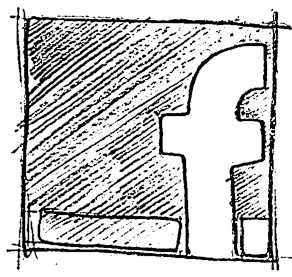by Ida Griesemer
I met Sam Herring, the front man of Future Islands, on April 4th before his show at Glasslands. We strolled around a corner and sat on a little ledge and talked for a little while. This is the second and final part of the interview.
View: Part 1
LL: Who was writing the songs?
SH: Gerrit and William worked out the songs, and then I would come in and write to them. It was never successful with me writing words first and then coming to those guys, because I don't know how to speak in music language. And that kind of goes back to my hip-hop roots of freestyle, feeling a song, feeling how it makes me feel and translating that emotion into words. And also just riffing off something. Because usually when we play songs live they aren't completely written yet. It's kind of fractured. I'll have a chorus, or a first verse and a chorus, and we'll just play it and see what comes out of my mouth. If there's melodies that work I might hold on to them.
LL: So a lot of it is improvisation?
SH: Well, definitely in the beginning process of writing songs it's a lot of improv and I don't wanna say jamming, but definitely jamming and feeling things out. I mean, Gerrit's the principal songwriter now. Because now that we don't have a drummer - for the last year and a half we haven't had a drummer – so Gerrit's had to do double duty. He's doing drum programming and keyboards. That allows him to go in and take over the structure. And then William comes in. It used to be that Eric would kick something simple and those guys would work together and figure something out, but now Gerrit's taken that over. That's been interesting because Gerrit has his own mode. But it's good because we really just need things to write with. For me, I just need some music.
LL: How did the more pop feeling come about? You said that it was a little bit sloppy at first, but did it become something that you were all very comfortable with and excited about?
SH: Well, I don't know. It was always kind of shaky. I mean it was fun, no doubt. Our first band was three keyboards and a bass guitar. And then we immediately went from having the electronic drum beat to having a live drummer behind us. And for me personally, as a performer, that propelled me in a different way. I was already very charismatic and frenetic lead singer, but having the drums was dynamite under me. It became more of a punk band at first. It was much faster and much – William's bass playing style changed a lot in the very beginning. But we slowly started writing deeper songs, with Eric. But I really feel like it was after Eric left, when we got back to the three of us, that we started writing at the pace that we wanted with the songs. Future Islands really sped up. But we'd always been a pop band. Since the beginning we were making pop. Even if we weren't trying or didn't realize it, we were making pop music. It was like, catchy choruses and keyboards and dance-y drum beats – stuff like that. It was interesting for me because it allowed me more space to go as a performer, having the drums behind me. Because when that got taken away, when we were without a drummer after two years of having one, it felt really alien to not have that behind me anymore. And then I had to fight to get back to who I was before. And then I've finally found a medium between then. That power, and also that poise, as a performer. To move like I have a drum kit behind me. To know what that was like helps me to tap into that. So that's important, to me personally. I've never really thought about that before.
LL: What brought you to Baltimore?
SH: The Wham City scene. Those are really good friends of ours. Of course Dan Deacon, who is the most instrumental member of Wham City. I think the first time we played with Dan was either late 2003 or early 2004. So it was right in the beginning of Art Lord. And you know, when we got into town there were only a couple bands that were really doing anything. Valiant Thor who is now a huge warp tour band, they were like touring with Motorhead and they've done tours with the Misfits, just like, really crazy shit. They were the dudes who had been around town for a while and they were like the band. Then there was the Kick Ass, who I was a big fan of. Instrumental. At their best, they sounded like Tortoise. Really intricate metal. It's kind of like jazz-metal. And then we came along, and the scene was kind of dead and we started something up. Just started up a house party scene again. Because there had been one in the past, but nobody was really doing anything. So we started a band because we wanted to play a party, play for our friends and bring people together. So we started a small scene, a house party scene, and became pretty quickly – thanks to the Kick Ass, they put us on our first club bill, opening for them in Greeneville – and we started to get a following. So when Dan came around, his first time a guy in town booked him and asked if we would headline the show to bring this guy in. This weird noise guy. And that's when we met Dan. It was his first tour ever. We didn't really become friends that night. We met, and he enjoyed our set. It was kind of funny, because his set was so weird to me. It was different than anything I had heard or seen, and it was just kind of like – I didn't know what to make of it. And it wasn't until another six months after that when we played with him at this noise fest in Hampton, Virginia at this place called the Rat's Ward that I got to see him perform as a performer. That’s the thing – Dan's taken back the stage now, come to present time, but until we were on that tour with him this time last year, he hadn't performed on a stage in something like four or five years. He would be out in the crowd. And you don't really get to see Dan, but he was one of my favorite performers. Extremely - he just had so much energy and movement, and was a very strange, enigmatic character, like he is. But I was really drawn to that and we became friends doing that thing. And he started coming down to Greenville a lot because he was blown away by Greenville that first time, and then the subsequent times, because we had something really interesting going. We did tours with him and we would play to nobody, but in Greenville, you know, we were kings. And Dan would come and we'd just have these crazy parties and just have a good time. So we became really good friends. And then basically he moved to Baltimore in the beginning of '05 or late '04, and shortly after that we did our last tour as Art Lord and the Self Portraits with Dan. And then we broke up. Even back then he was pushing us to move to Baltimore. That was at the very beginning of Wham City and Baltimore. It was kind of an entity before it was in Baltimore, at SUNY Purchase. So we eventually just got to Baltimore. When I moved to Baltimore, I thought that Future Islands was just gonna break up, because I was living in Ashville, North Carolina, Gerrit was in Greenville, William was in Raleigh. We weren't making any music. Eric had quit the band. Partly because I was a dickhead. It was a bad thing. I kinda fucked up. And I just thought it wasn't gonna happen, because Gerrit didn't want to move. He didn't want to move to Baltimore. And I was like, "I'm gonna move to Baltimore and I'm gonna start a new band and I'm gonna do my thing. There's musicians there, I'm gonna go do that. This is what I want with my life." And then William's like, "Oh, I'm gonna do that too!" And we're like, "Awesome! We can start a band!" So William actually beat me up there, he got there in November '07 and I got that January '08 and then shortly after that Gerrit split up with his long time girlfriend and was like, lonely as fuck in Greenville, North Carolina. And we're like, "Move to Baltimore!" and against his will power he moved to Baltimore. And things have been great for us. It really changed – well of course we're all finally in the city for the first time in almost two years. I was cleaned up, doing really good, was happy about stuff, and had my friends again. And it was interesting because I had to re-learn that friendship. My oldest friends, but it was kind of weird at first because I had been away for so long. I mean you know, you change, you grow. It's weird to think, because I'm turning 26 next month, but that was only – I was 23 when I moved to Baltimore. Because I felt so much older. I felt like an old man. But I wasn't that old. So we got up there and things were cool. We had a lot of friends. It was mainly because of the friends, and just knowing that something was going on there. But it really helped us because we didn't really fit into North Carolina. We were always just seen as this weird dance band, because we were a dance band and there aren't really a lot of dance bands in North Carolina. Or bands that don't use a guitar. Everybody would write us up and write us off as weirdo, bizarre musicians. And then when we got to Baltimore is was like, "These guys are the new serious guys in Wham City." And we were like, "Whoaaa! We're serious, man!" We were so happy. And now we go back to North Carolina and they're like, "The prodigal sons have returned! They're coming back!" So we get a lot of respect now. But it was like, us going away was us trying to get out of a comfort zone. Trying to get out of that comfort zone of our college town, or our hometown, or anything that would suck us in. And Baltimore kind of put us on edge. We were a little afraid when we moved there. We were all afraid. Not only of the city but just of the circumstances and being outside a comfort zone, and that propelled us and pushed us to do something. But also it a little bit pushed us to get out of the city and go on tour! Hahaha. But also made us stronger friends, because we had each other. I do feel that that element of fear or that element of struggle does bring people together and creates strong bonds between people. You know, when you're all in it together. I mean, just getting by in general. Then again, in New York I can only imagine it's so much harder to get by because it's so fucking expensive. Baltimore is chill as far as that goes. Prices are still pretty low. I mean it is going up, because there's a lot of gentrification going on too. A ton of gentrification. So the city's being cleaned up. And that's good and bad.
It really did work. We were trying to be more serious. We went to Baltimore and we just went on tour. In the first year and half that we were there, we were gone for a year of that on the road. And that was what we wanted to be doing. We didn't have jobs, we were out of school, our girlfriends had left. It was like, "This is your life now." So it was kinda interesting.
LL: Has Baltimore remained a city that has a lot to offer for you as a creative community?
SH: Yeah. You've got the school feeding a lot of that. You've always got fresh, young kids, art students coming in, and they start their band or grab a warehouse spot and they're always making art or going to shows, and that's important. But then again, there's a huge transplant just from the outs, and I didn't really know where that started. I mean, I still feel new to Baltimore. We've only been there two years. I definitely can't speak for Baltimore, like what the city is or what it has been, because I am still one of the newbies. It's interesting. Like my friend Denny from Double Dagger, the drummer, he's one of the only musicians in Baltimore I know that is from Baltimore. And he tells me crazy stories about going to shows when he was 13, 14, 15. Just kinda wild.
It really is a hub. You have to pass through Baltimore going between the South and New York. It's always been a hub. But there's tons of musicians, a lot of artists, interesting people. People are doing things, and that's what's cool. There's always something going on. Sometimes you have to get out. I miss North Carolina a lot. We definitely won't get out of Baltimore for a little while. But we do all miss the South. That vibe. If we moved back home now it would be a bad move. We'd fall into old spells. But it's comforting. Like, "One day I shall return."





0 comments:
Post a Comment